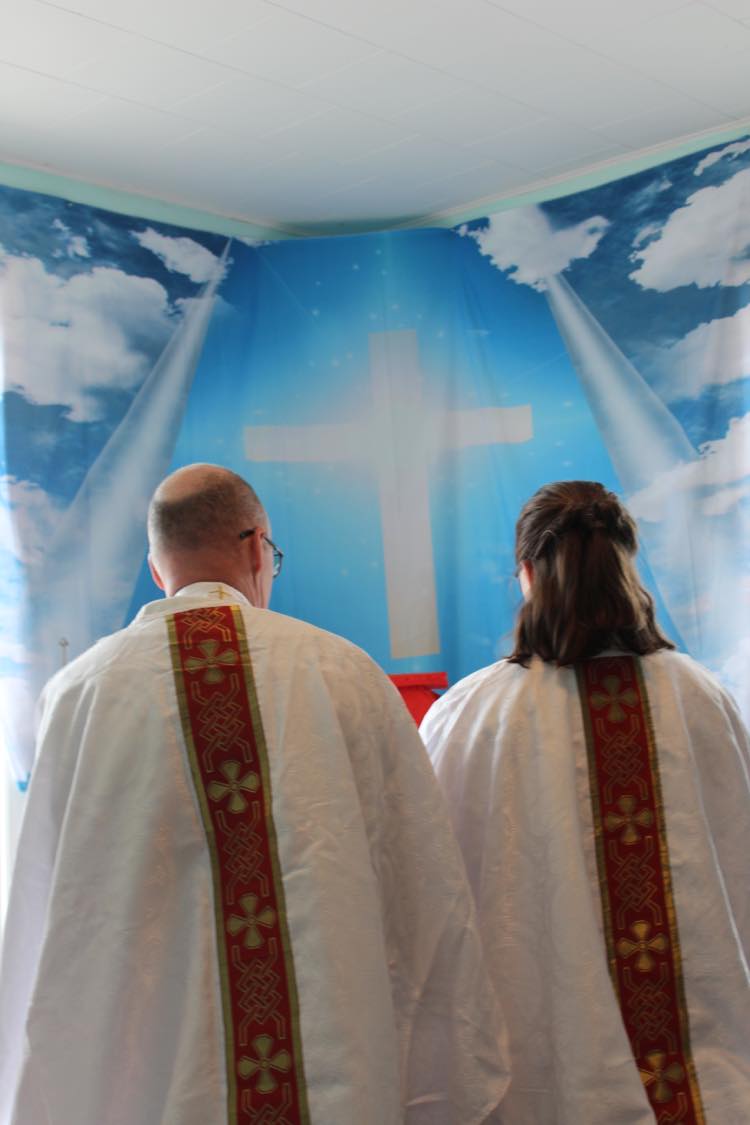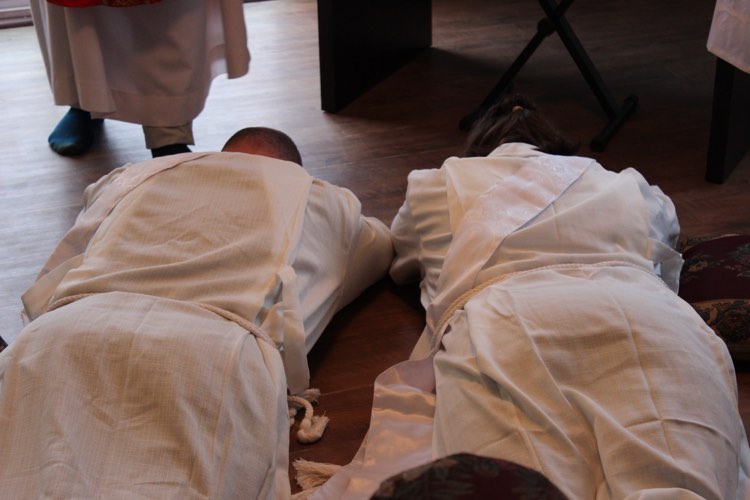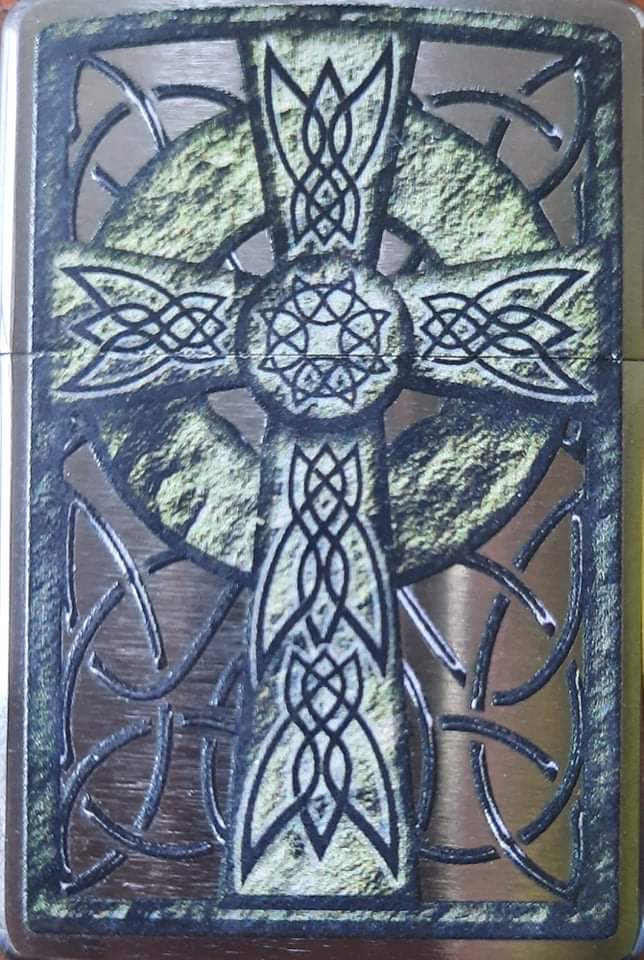- Home
- simply catholic
- Catholic Rosary Prayers and Mysteries
Simply Catholic and Welcoming You
Catholic Rosary Prayers and Mysteries
The catholic rosary has five decades of prayers and we focus on one mystery from four sets of mysteries as we say each decade. There is also a tradition of focusing on specific mysteries on specific days of the week.
I thank my (deceased) mother for my love and devotion to the rosary and to Mary. She is the one who, in typical Irish Catholic fashion, gathered all us kids every evening to say the rosary. She is the one who first taught me several versions of the rosary and encouraged me to learn of Mary's promises to those who made the rosary a daily devotional.
Praying the Rosary
Make the Sign of the Cross.
Holding the Crucifix, say the Apostles' Creed.
On the first bead, say an Our Father.
Say one Hail Mary on each of the next three beads.
Say the Glory Be
For each of the five decades, announce the Mystery (sometimes followed by a brief reading from Scripture)
Then say the Our Father.
While fingering each of the ten beads of the decade, next say ten Hail Marys while meditating on the Mystery.
Then say a Glory Be.
(After finishing each decade, some say the following prayer requested by the Blessed Virgin Mary at Fatima: O my Jesus, forgive us our sins, save us from the fires of hell; lead all souls to Heaven, especially those who have most need of your mercy.)
After saying the five decades, say the Hail, Holy Queen, followed by this dialogue and prayer:
Pray for us, O holy Mother of God.
That we may be made worthy of the promises of Christ.
Let us pray: O God, whose Only Begotten Son, by his life, Death, and Resurrection, has purchased for us the rewards of eternal life, grant, we beseech thee, that while meditating on these mysteries of the most holy Rosary of the Blessed Virgin Mary, we may imitate what they contain and obtain what they promise, through the same Christ our Lord. Amen.
Conclude the Rosary with the Sign of the Cross.
Mysteries of the Rosary
Joyful Mysteries of the Rosary
Monday & Saturday
The Annunciation of the Lord to Mary
Mary is chosen to be the mother of Jesus.
The Visitation of Mary to Elizabeth
Elizabeth recognizes Mary as the mother of our Lord.
The Nativity of our Lord Jesus Christ
Jesus is born and laid in a manger.
The Presentation of our Lord
Jesus is presented in the Temple of Jerusalem.
Finding Jesus in the Temple
Jesus is found discussing God's laws in the temple.
Sorrowful Mysteries of the Rosary
Tuesday & Friday
The Agony of Jesus in the Garden
Jesus prays when confronted with the sins of the world.
The Scourging at the Pillar
Jesus is whipped before His execution.
Jesus is Crowned with Thorns
Jesus is mocked with a painful crown of thorns.
Jesus Carried the Cross
Jesus carries the weight of our sins to His crucifixion.
The Crucifixion of our Lord
Jesus Christ dies to save all mankind.
The Glorious Mysteries of the Rosary
Wednesday & Sunday
The Resurrection of Jesus Christ
Jesus rises triumphant over death.
The Ascension of Jesus to Heaven
As Jesus ascends, He gives us a special task.
The Descent of the Holy Ghost
At Pentecost the Church is born.
The Assumption of Mary into Heaven
The Virgin Mary is gloriously assumed into heaven.
Mary is Crowned as Queen of Heaven and Earth
Mary is honored above all creatures.
Luminous Mysteries of the Rosary
Thursday
The Baptism in the Jordan
God proclaims Jesus is His Son.
The Wedding at Cana
Jesus performs a surprising miracle at a wedding.
The Proclamation of the Kingdom
Jesus calls us to do something important.
The Transfiguration
Jesus is gloriously transformed.
The Institution of the Holy Eucharist
Jesus shares His Body and Blood for our salvation.
The Introduction of The Luminous Mysteries of The Catholic Rosary
Mary gave the rosary and prayers to St. Dominic in the 12th century.
The first three sets of mysteries of the rosary were introduced by Dominic of Prussia sometime between 1410 and 1439. He gave us the Joyful, Sorrowful and Glorious mysteries for a total of 15 mysteries.
In 2002 Pope John Paul II introduced the Luminous Mysteries – based on a compilation by George Preca, the first Maltese saint – as an option in an apostolic letter on the rosary, Rosarium Virginis Mariae.
The Luminous Mysteries were introduced by Pope St. John Paul II in 2002 to highlight the Christological character of the Rosary and to give it fresh life. He reasoned that they would help Catholics focus on the public life of Jesus and re-engage with the Rosary as a devotional tool.
By adding these Luminous Mysteries, St. John Paul II aimed to enrich the Rosary and provide a more complete reflection on the life and mission of Jesus Christ.
There are some people who, 'since these luminous mysteries were not originally given by Mary to St. Dominic in the 12th century', refuse to add these mysteries to their rosary devotions today. It would seem that they missed that Mary gave the rosary and the prayers to St Dominic in the 12th century but it was Dominic of Prussia sometime between 1410 and 1439 who gave us the Joyful, Sorrowful and Glorious mysteries for a total of 15 mysteries.
These were not the same Dominic's so I fail to see the objection to a sainted pope adding further value and wonder to this already beautiful devotional. In any event the official position of the catholic church is that the mysteries are an option when praying the rosary and indulgences are granted with or without their addition.
From Mary's conversation with St Dominic, the rosary was originally known as Mary’s “Psalter”. Initially “Mary’s Psalter,” or the “Poor Man’s Psalter,” was prayed as a substitution for the Divine Office said by priests. When recited, the 15 decades account for 150 Hail Mary's, corresponding to the 150 Psalms.
For an uneducated general populace, who could not themselves read the psalms this was an option they could do and thus the devotional grew in favor globally.
Recent Articles
-
Catholic-Confession
Apr 19, 25 08:53 PM
Full breakdown of the Catholic Confession Sacrament of Reconciliation -
Ordination, incardination and dismissal of clergy
Mar 03, 25 06:47 PM
Overview of Ordination to Holy Orders, incardination and dismissal of clergy -
Catholic Last Rites
Mar 03, 25 06:41 PM
An explanation of the Catholic Last Rites and Anointing of the Sick


